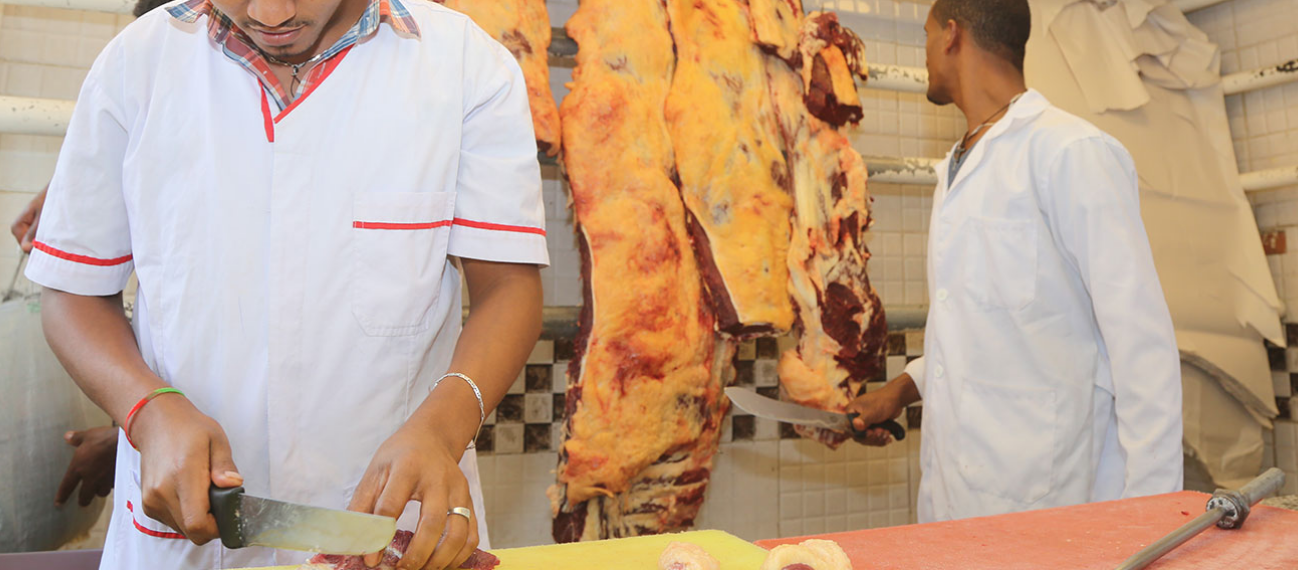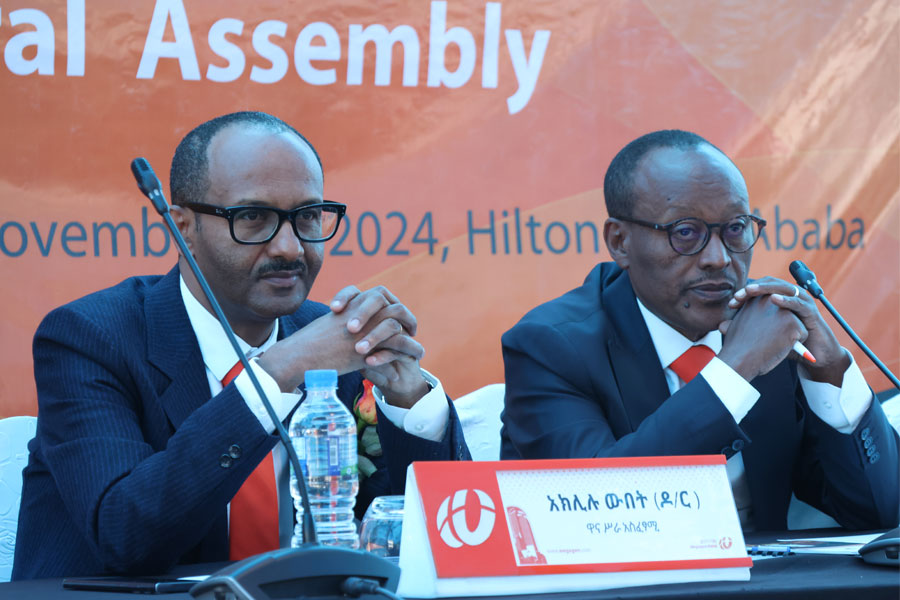
Fortune News | Jun 13,2025
Jemal Abdella, a traditional subsistence farmer and cattle herder, followed the footsteps of his father as have generations of settlers in Bale Mountains National Park, located 400Km southeast of Addis Abeba.
Jemal's father, born and raised in Rira kebele, one of 26 villages and five weredas located in Bale Zone, dwelled in the area long before it was established as a national park. The only son, Jemal didn’t go to school and grew up herding his father’s cattle instead and helped on the farm until he got married at the age of 19.
Following the customs of the region, Jemal formed his own separate household after his marriage with a gift of three cattle from his father. He settled by clearing a section of the forest to build his own house and established a farm.
Jemal and the other settlers in the park follow traditional systems in using the resources of the Bale Mountains by cultivating the lowlands during the growing and harvest seasons, keeping their cattle on higher grounds to graze and moving their livestock into wooded areas during the dry seasons.
The park, established in 1970, is made up of moorlands, juniper forests, volcanic plugs, peaks, alpine lakes and mountain streams that descend into the fertile farmland of the lowlands below.
It supports 1,600 flowering plant species of which 163 are endemic; is home to 78 mammal species including the endangered Ethiopian wolf (Canis simensis) and the Mountain Nyala (Tragelaphus buxtoni); and 310 different bird species. The vegetation is also a source of traditional phytomedicines used by herbalists with the park offering over 340 varieties of medicinal plants.
The park has an altitude that ranges from 1,500m to 4,392m, are and covers an area of 2,150 square kilometres, four times the size of Addis Abeba.
What makes Jemal's village, Rira, different from the other 25 communities is its location within the Park. Though Jemal claims that even his father was born in the area, historical reports show that there were no permanent settlements in the Bale Mountains before the 1960s, but there were migratory settlers since the 17th century.
Park officials argue that the problem is much bigger than what they can handle.
Before the establishment of the Park, the total human population was low. Now about 672 households along with Jemal live in Rira kebele which grew from 430 households just seven years ago.
The population in the park is growing along with the farmlands and cattle pushing and clearing into the forested areas as new families are created generation after generation.
The increase in human population within the park’s boundaries has increased pressure on the natural resources of the area.
Settlement in the Park also happens to diminish available natural habitats for the wild animals and threatens the biological significance of the area. Though settlement in national Parks is illegal and punishable by law, the people of Rira have been living there for decades.
But that does not mean that the residents of Rira are illegal. The kebele is recognised by the government and gets an annual budget. It also has a school, a health centre and a police station.
Bale National Park.
The government could not relocate the inhabitants as it has not received alternative resettlement solutions, according to Aschalew Gashaw, warden of the Park. As the population of Rira continuously increases, the farmers and settlements are expanding and claiming more of the natural areas for farming and building homes.
Research shows that even as early as 2012 about 10,000ha of land inside the park was used for agriculture.
For Guy Levene, owner of the only operational lodge in the park, Bale Mountains Lodge, the expansion of the settlement in the park is alarming. His lodge is located within the main forested habitat of Harena, a section of the park.
The expansion of human activities deep into the forest is having a huge negative impact on the park, according to Levene.
“We are no longer able to observe some species that were commonly seen in the park," Levene told Fortune.
Research shows that even as early as 2012 about 10,000ha of land inside the park was used for agriculture.
He also presumes that either the animals such as the lions have moved away from humans or they have been killed by the farmers to protect their cattle.
The Ethiopian wolf, Africa’s most endangered carnivore, is threatened by domesticated dogs that spread rabies, and have reduced the wolf population from 600 to 250 in recent years.
But the people of Rira do not believe they pose threats to the park, speaking proudly that they are part and parcel of the forest ecosystem.
One method of conservation practices they point to is that they remove the understory and keep the canopy trees.
Levene begs to differ on this.
“The understory vegetation is as important as the trees, if not more, in providing a complex habitat balance of the ecosystem,” said Levene.
Not only is the human population in Rira growing, but also grazing areas by livestock have expanded.
Overgrazing has left large exposed areas with no vegetation where soil erosion is rampant and soil fertility has been lost, according to Levene.
Settlers have cleared a section of the protected forest area.
He fears that the overgrazing could dry out rivers and impact the natural surface water hydrology.
Bale Mountains National Park is the source for 40 rivers including the Wabi Sheble that serve as water supply for around 13 million people.
The effect of the overgrazing is being witnessed on Togena River, where the vegetation along the banks has been destroyed by clearing that it caused the river to dry out, Levene argues.
The people of Rira, on the other hand, feel neglected by the government.
“We haven’t got any economic benefits from the Park,” said Keaye Haji Kasim, administrator of Rira Kebele. "Even the school we have was built during the Dergue regime."
Due to this, claims Keaye, their children are forced to travel to nearby towns to continue their education.
"The only reason officials come to us is to tell us to stop farming the area," Keaye told Fortune. "This does not make sense as the government is not able to provide us with alternative means of living."
Park officials argue that the problem is much bigger than what they can handle.
“We can’t just go and destroy the houses and farms inside the park boundaries,” said Aschalew, the warden.
He believes the problem needs an understanding and a common consensus.
Solomon Addisu (PhD), College Dean for Bahir Dar University's College of Agriculture & Environmental Sciences, believes the settlement in Bale would have been tolerable if it was at the peripherals of the park.
Since Rira Kebele is located in the heart of the park its impact on the resource of the Park is very high, according to Solomon.
He notes that discussions with stakeholders should be held soon. Solomon also suggests that the government provide alternative means of livelihood for the farmers and relocate them to a new area after paying them compensation.
With a population of 3,800, Rira kebele boasts a primary school, a health centre and even a police station.
Leelie Selassie, a diaspora visiting the park, believes it’s possible to change the dependency of Rira people from farming.
“The economic opportunities of the park are immense, and the government should find a way to capitalize on it,” Leelie told Fortune.
There are countries whose whole economy is based on tourism, she added.
Yet, Bale Mountain National Park's contribution to tourism revenue of the country is minimal. Each year, around 8,000 visitors come to the Park. And last fiscal year, the park generated less than a million Birr, while the 13 National Parks under the Ethiopian Wildlife & Conservation Authority generated 123 million Br in revenues.
Simien National Park, which was included in the World Heritage list, faced the same challenges. It was put the endangered list due to overgrazing and human settlement.
The 10-year management plan that is currently being implemented by the Ethiopian Wildlife & Conservation Authority could be a lasting solution, according to Gebremeskel Gizaw, director of National Parks Settlement & Shelter at the Authority.
"One of the pillars of the plan is relocating the residents of Rira Kebele to another area, which is not identified yet," said Gebremeskel. "We will have continuous discussions to decide on where they will be relocated and how much compensation they would get."
Conservationists suggest that if conservation efforts in the Bale Mountains are not successful and people continue to exploit the resources in an unsustainable way, more species of mammal and plants would disapear than in any other area of equivalent size on the planet.
Jemal, who was the only child for his father, now has 10 children of his own. The three cattle he revived when he got married have also increased their number to 20.
Though he wishes a better situation for his children and is sending them to school, he still sees them continuing the cycle of life style.
Meanwhile, with no alternatives in sight, after Jemal’s children start families of their own, they will also clear some land in the Bale Mountains National Park as it is slowly parceled a little at a time, into farms, grazing land and homes.
PUBLISHED ON
Jan 12,2019 [ VOL
19 , NO
976]

Fortune News | Jun 13,2025

Commentaries | Apr 29,2023

My Opinion | Jun 29,2024

Fortune News | Sep 24,2018

Sunday with Eden | Apr 22,2022


Fortune News | May 04,2025

Advertorials | Jul 31,2024

Fortune News | Nov 09,2024

Fortune News | May 07,2025

Dec 22 , 2024 . By TIZITA SHEWAFERAW
Charged with transforming colossal state-owned enterprises into modern and competitiv...

Aug 18 , 2024 . By AKSAH ITALO
Although predictable Yonas Zerihun's job in the ride-hailing service is not immune to...

Jul 28 , 2024 . By TIZITA SHEWAFERAW
Unhabitual, perhaps too many, Samuel Gebreyohannes, 38, used to occasionally enjoy a couple of beers at breakfast. However, he recently swit...

Jul 13 , 2024 . By AKSAH ITALO
Investors who rely on tractors, trucks, and field vehicles for commuting, transporting commodities, and f...

Oct 4 , 2025
Eyob Tekalegn (PhD) had been in the Governor's chair for only weeks when, on Septembe...

Sep 27 , 2025
Four years into an experiment with “shock therapy” in education, the national moo...

Sep 20 , 2025
Getachew Reda's return to the national stage was always going to stir attention. Once...

Sep 13 , 2025
At its launch in Nairobi two years ago, the Africa Climate Summit was billed as the f...